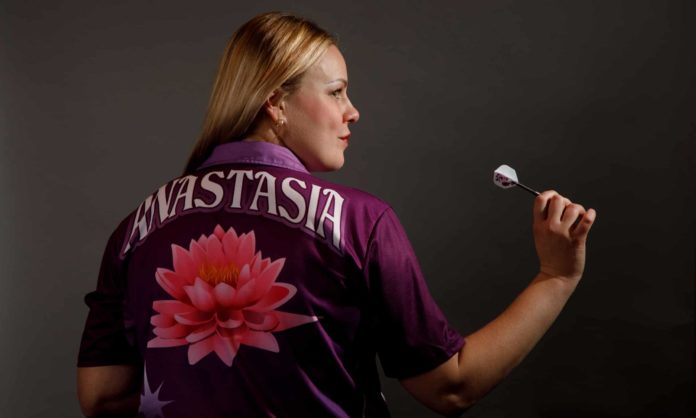Anastasia Dobromyslova smiles as she remembers the first time she played darts, as a 12-year‑old in her home city of Tver, just over 100 miles from Moscow, and realised she had an unerring knack for hitting trebles and doubles – and beating the older boys at her youth club. “I wasn’t very well liked,” she laughs. “I think that’s what toughened me up, because I’ve always had to be amongst the boys. Being a girl I have had to fight for my spot.”
Not a great deal has changed in the intervening two decades. But having qualified for one of two new women’s spots at this year’s expanded PDC World Championship, which begins at Alexandra Palace on Thursday, the 34-year-old Dobromyslova intends to make the most of her opportunity. “You don’t realise how many emotions I have,” she says. “I’m excited, I’m nervous and I know playing in front of thousands of people will be challenging. But with a bit of luck, who knows what could happen?”
No one doubts that Dobromyslova can play. She has been world women’s champion three times and famously beat the talented Dutchman Vincent van der Voort at the grand slam of darts in 2009. But the bookies make her a 5,000-1 shot for success, which is accurate given that she has had an indifferent year partly due to juggling practice with looking after her 21-month-old son, Joseph.
“My typical day is very different to most players,” says Dobromyslova, who lives in Ellesmere Port with her husband Tony, a former darts professional who now works as a housing support officer. “Usually, after breakfast, Joseph and I will go for a walk to the playground or do some painting and decorating at home. Hopefully he has a nap about noon and I can have an hour to practise before he wakes up – but then it’s dinner, more play and Peppa Pig and Paw Patrol before Tony comes home from work and we all spend some time together.
“I can’t blame my play on the baby and motherhood but at the same time we are all human,” she adds. “We all have good years and bad years, good days and bad days. And obviously I haven’t ended up practising as much as I should. It doesn’t help.”
Is she affected by people shouting out? “It depends on the day,” she admits. “Sometimes I am so focused I hardly hear my friends calling out. Afterwards my family will sometimes say, ‘Did you hear us?’ – and I won’t hear a thing. But the next time I play I can hear everything and anything. Sometimes you can just pick out one voice in the whole crowd and you think: ‘Oh no …’
“But do you know what is so funny?” she adds. “When I play my best darts afterwards I often can’t remember the game. Sometimes I am so focused I don’t even realise the match has finished until I hear, ‘Game-shot and the match.’ It’s when I am deep in the zone that I play well.”
If she beats Joyce she will earn a second-round meeting with the 2010 world champion runner-up Simon Whitlock – and at least £15,000 in prize money – which would be the biggest cheque of her career. And she knows she would also strike a hammer blow for women in a game dominated by men.
Yet given darts is one of the few sports where women are not at a biological disadvantage, could they one day challenge the best in the world? “We have a great field of youth players, and they are all more than capable of doing it in the future,” she says. “Look at someone like Beau Greaves, who is only 14 yet averaged 99 in a local league match. She is a really talented young girl. But at the moment there are not enough women’s tournaments for players to get experience. If we could play on a weekly or monthly basis you would say, ‘Yeah, it is a possibility.’ But at the moment it is much harder.”
Dobromyslova has played in the PDC world championship once before, in 2009, when she lost 5-3 in the preliminary round. She still remembers the late Eric Bristow insisting that “the Russian bird” shouldn’t be playing – so are attitudes better now than 10 years’ ago? “Probably, but not all people have changed,” she says. “You always have the odd critical person but at the end of the day everybody is entitled to their own opinion. And do you know what? I am entitled to do what I want. It doesn’t concern me at all because I’ve done what I had to do to qualify.”
This year’s PDC world championship appears a reasonably open affair with the world No 1, Michael van Gerwen, looking an unusually vulnerable favourite. The Dutchman tends to peak for the world championship but he has failed to win any of the last four big tournaments. And with the second favourite, Gary Anderson, also in Van Gerwen’s half of the draw, and the reigning champion, Rob Cross, having struggled in recent months, it could be that Peter Wright, the No 3 seed, the enigmatic Austrian Mensur Suljovic or the muscly former rugby-playing Welshman Gerwyn Price make a run deep into the tournament.




































